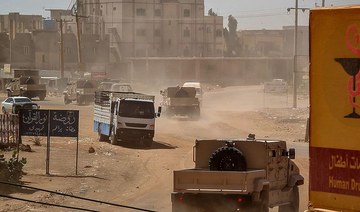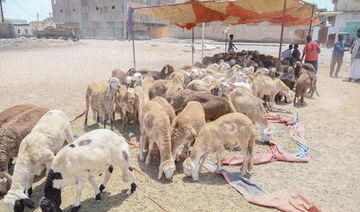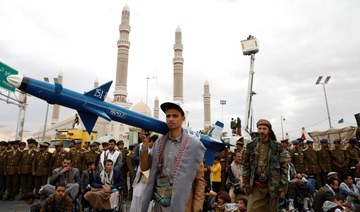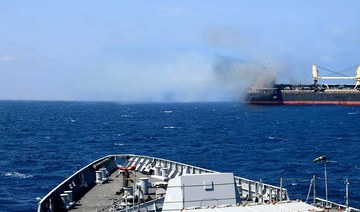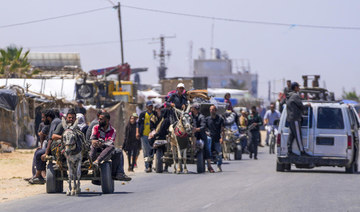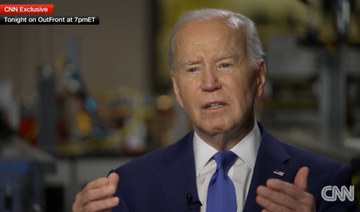DUBAI: Thousands of men who worked as intelligence operatives under former president Omar Al-Bashir and have ties to his Islamist movement are fighting alongside the army in Sudan’s war, three military sources and one intelligence source said, complicating efforts to end the bloodshed.
The army and a paramilitary force have been battling each other in Khartoum, Darfur and elsewhere for 10 weeks in Africa’s third largest country by area, displacing 2.5 million people, causing a humanitarian crisis and threatening to destabilize the region. Reinforcements for either side could deepen the conflict.
The army has long denied accusations by its rivals in the Rapid Support Forces (RSF) that it depends on discredited loyalists of Bashir, an Islamist long shunned by the West, who was toppled during a popular uprising in 2019.
In response to a question from Reuters for this article, an army official said: “The Sudanese army has no relation with any political party or ideologue. It is a professional institution.”
Yet the three military sources and an intelligence source said thousands of Islamists were battling alongside the army.
“Around 6,000 members of the intelligence agency joined the army several weeks before the conflict,” said a military official familiar with the army’s operations, speaking on condition on anonymity.
“They are fighting to save the country.”
Former officials of the country’s now-disbanded National Intelligence and Security Service (NISS), a powerful institution composed mainly of Islamists, confirmed these numbers.
An Islamist resurgence in Sudan could complicate how regional powers deal with the army, hamper any move toward civilian rule and ultimately set the country, which once hosted Al-Qaeda founder Osama bin Laden, on a path for more internal conflict and international isolation.
Reuters spoke to 10 sources for this article, including military and intelligence sources and several Islamists.
In a development indicative of Islamist involvement, an Islamist fighter named Mohammed Al-Fadl was killed this month in clashes between RSF forces and the army, said family members and Islamists. He had been fighting alongside the army, they said.
Ali Karti, secretary general of Sudan’s main Islamic organization, sent a statement of condolences for Al-Fadl.
’OUR IDENTITY AND OUR RELIGION’
“We are fighting and supporting the army to protect our country from external intervention and keep our identity and our religion,” said one Islamist fighting alongside the army.
Bashir’s former ruling National Congress Party said in a statement it had no ties to the fighting and only backed the army politically.
The army accused the RSF of promoting Islamists and former regime loyalists in their top ranks, a charge the RSF denied. Army chief Abdel Fattah Burhan, who analysts see as a non-ideological army man, has publicly dismissed claims that Islamists are helping his forces. “Where are they?” he cried out to cheering troops in a video posted in May.
The military, which under Bashir had many Islamist officers, has been a dominant force in Sudan for decades, staging coups, fighting internal wars and amassing economic holdings.
But following the overthrow of Bashir, Burhan developed good ties with states that have worked against Islamists in the region, notably the United Arab Emirates (UAE), Saudi Arabia and Egypt. The Gulf states provided Khartoum with significant aid.
Nowadays, former NISS officers also help the military by collecting intelligence on its enemies in the latest conflict. The NISS was replaced by the General Intelligence Service (GIS) after Bashir was toppled, and stripped of its armed “operations” unit, according to a constitutional agreement.
Most of the men from that unit have sided with the army, but some former operations unit members and Islamists who served under Bashir entered the RSF, one army source and one intelligence source said.
“We are working in a very hard situation on the ground to back up the army, especially with information about RSF troops and their deployment,” said a GIS official.
BASHIR-ERA VETERANS
The army outnumbers the RSF nationally, but analysts say it has little capacity for street fighting because it outsourced previous wars in remote regions to militias. Those militias include the “Janjaweed” that helped crush an insurgency in Darfur and later developed into the RSF.
Nimble RSF units have occupied large areas of Khartoum and this week took control of the main base of the Central Reserve Police, a force that the army had deployed in ground combat in the capital. They seized large amounts of weaponry.
But the army, which has depended mainly on air strikes and heavy artillery, could benefit from GIS intelligence gathering skills honed over decades as it tries to root out the RSF.
On June 7, fire engulfed the intelligence headquarters in a disputed area in central Khartoum. Both sides accused the other of attacking the building.
After Burhan and RSF leader General Mohamed Hamdan Dagalo, known as Hemedti, carried out a coup in 2021 which derailed a transition to democracy, Hemedti said the move was a mistake and warned it would encourage Islamists to seek power.
Regional heavyweights Saudi Arabia and the UAE had seen Sudan’s transition toward democracy as a way to counter Islamist influence in the region, which they consider a threat.
Publicly, the army has asserted its loyalty to the uprising that ousted Bashir in 2019.
But after the military staged a coup in 2021 that provoked a resurgence of mass street protests, it leaned on Bashir-era veterans to keep the country running. A taskforce that had been working to dismantle the former ruling system was disbanded.
Before the outbreak of violence, Bashir supporters had been lobbying against a plan for a transition to elections under a civilian government. Disputes over the chain of command and the structure of the military under the plan triggered the fighting.
About a week after fighting broke out in April, a video on social media showed about a dozen former intelligence officials in army uniforms announcing themselves as reserve forces.
The footage could not be independently verified by Reuters.
Several senior Bashir loyalists walked free from prison in Bahri, across the Nile from central Khartoum, during a wider prison break amid fighting in late April. The circumstances of their release remain unclear. Bashir is in a military hospital.
Islamists wield hidden hand in Sudan conflict, military sources say
https://arab.news/b63yv
Islamists wield hidden hand in Sudan conflict, military sources say
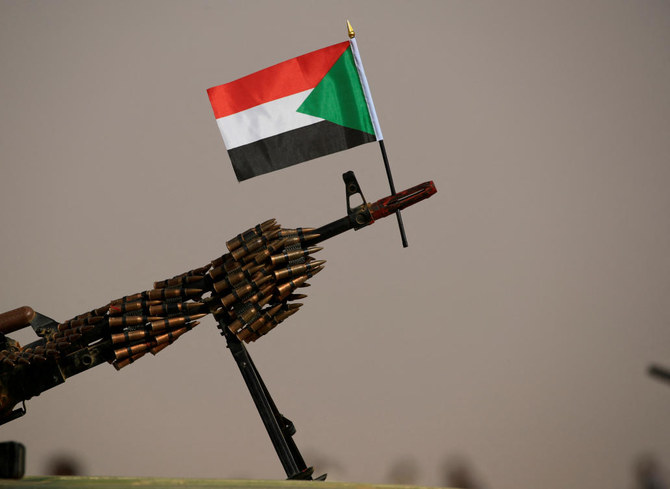
- Ex-intelligence agents fighting alongside army-sources
- Army has leant on Bashir-era veterans since 2021 coup
- Conflict pits army general against ex-militia leader
Turkiye says it killed 17 Kurdish militants in northern Iraq, Syria
In a post on social media platform X, the ministry said its forces had “neutralized” 10 PKK insurgents found in the Gara and Hakurk regions of northern Iraq, and in an area where the Turkish military frequently mounts cross-border raids under its “Claw-Lock Operation.”
It said another seven militants were “neutralized” in two regions of northern Syria, where Turkiye has previously carried out cross-border incursions.
The ministry’s use of the term “neutralized” commonly means killed. The PKK, which has been waging an insurgency against the Turkish state since 1984, is designated a terrorist organization by Turkiye, the United States and the European Union.
Turkiye’s cross-border attacks into northern Iraq have been a source of tension with its southeastern neighbor for years. Ankara has asked Iraq for more cooperation in combating the PKK, and Baghdad labelled the group a “banned organization” in March.
Last month, Turkish President Tayyip Erdogan held talks with officials in Baghdad and Irbil, the capital of Iraqi Kurdistan, about the continued presence of the PKK in northern Iraq, where it is based, and other issues. Erdogan later said he believed Iraq saw the need to eliminate the PKK as well.
Turkiye has also staged military incursions in Syria’s north against the YPG militia, which it regards as a wing of the PKK.
Erdogan and his ministers have repeatedly said that while Ankara is working on repairing ties with Syrian President Bashar Assad’s government after years of animosity, it will mount a new offensive into northern Syria to push the YPG away from its border.
Israeli demonstrators torch part of UN compound in Jerusalem
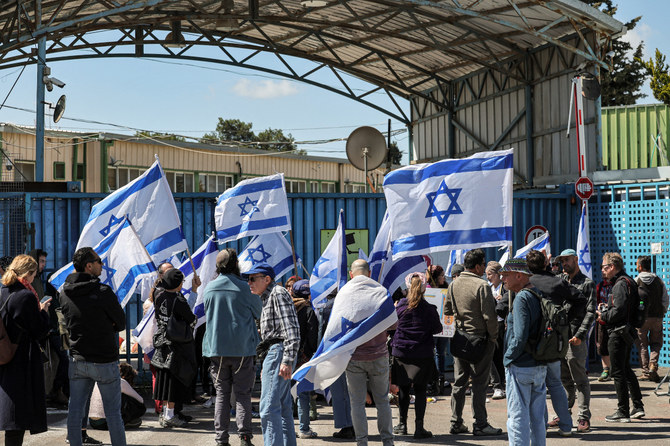
- Compound closed until proper security was restored
- Thursday’s incident was the second in less than a week
JERUSALEM: The main United Nations aid agency for Palestinians closed its headquarters in East Jerusalem after local Israeli residents set fire to areas at the edge of the sprawling compound, the agency said.
Philippe Lazzarini, the head of UNRWA, said in a post on the social media platform X that he had decided to close the compound until proper security was restored. He said Thursday’s incident was the second in less than a week.
“This is an outrageous development. Once again, the lives of UN staff were at a serious risk,” he said.
“It is the responsibility of the State of Israel as an occupying power to ensure that United Nations personnel and facilities are protected at all times,” he said.
This evening, Israeli residents set fire twice to the perimeter of the UNRWA Headquarters in occupied East Jerusalem.
— Philippe Lazzarini (@UNLazzarini) May 9, 2024
This took place while UNRWA and other UN Agencies’ staff were on the compound.
While there were no casualties among our staff, the fire caused extensive damage… pic.twitter.com/ZqHFDNkiWC
UNRWA, set up to deal with the Palestinian refugees who fled or were forced from their homes during the 1948 war around the time of Israel’s creation, has long been a target of Israeli hostility.
Since the start of the war with Gaza Israeli officials have called repeatedly for the agency to be shut down, accusing it of complicity with the Islamist movement Hamas in Gaza, a charge the United Nations strongly rejects.
Israel considers all of Jerusalem its indivisible capital, including eastern parts it captured in a 1967 war, which Palestinians seek as the future capital of an independent state.
Lazzarini said staff were present at the time of the incident but there were no casualties. However outdoor areas were damaged by the blaze, which was put out by staff after emergency services took time to respond.
There was no immediate comment from the Israeli police.
Lazzarini said groups of Israelis had been staging regular demonstrations outside the UNRWA compound for the past two months and said stones were thrown at staff and buildings in the compound this week.
In footage shared with Lazzarini’s post, smoke can be seen rising near buildings at the edge of the compound while the sound of chanting and singing can be heard.
A crowd accompanied by armed men were witnessed outside the compound chanting “Burn down the United Nations,” Lazzarini said.
UKMTO reports hijacking attempt of vessel east of Yemen’s Aden
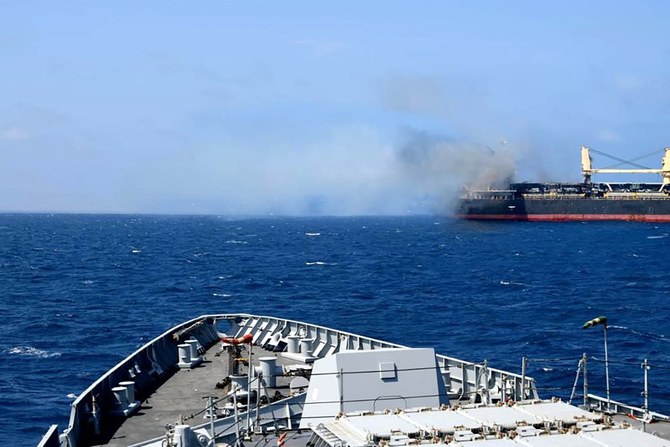
DUBAI: The United Kingdom Maritime Trade Operations (UKMTO) organization said on Friday it had received a report of a failed hijacking attempt of a vessel 195 nautical miles east of Yemen’s Aden.
The vessel’s master reported being approached by a small craft carrying five or six armed people with ladders.
Houthi militants in Yemen have launched drone and missile attacks on shipping in and around the Red Sea and the Indian Ocean to show support for the Palestinians in the Gaza war.
Maritime sources say pirates may be encouraged by a relaxation of security or may be taking advantage of the chaos caused by attacks on shipping by the Iran-aligned Houthis.
After firing on the vessel, the people in the small craft were forced to abort their approach when the security team on the vessel returned fire, the UKMTO reported.
The vessel and its crew are reported to be safe, and the vessel is proceeding to its next port of call, it said.
Hamas says ‘ball is completely’ in Israel’s hands in Gaza truce talks
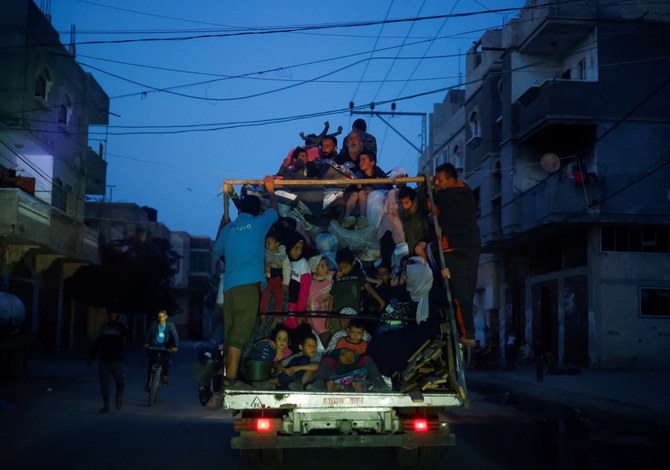
GAZA STRIP: Palestinian militant group Hamas said early Friday that its delegation attending Gaza ceasefire negotiations in Cairo had left the city for Qatar, adding the “ball is now completely” in Israel’s hands.
“The negotiating delegation left Cairo heading to Doha. In practice, the occupation (Israel) rejected the proposal submitted by the mediators and raised objections to it on several central issues,” the group said in a message to other Palestinian factions, adding it stood by the proposal.
“Accordingly, the ball is now completely in the hands of the occupation.”
State-linked Egyptian outlet Al-Qahera News reported Thursday that representatives of both camps left Cairo after two days of negotiations aimed at finalizing a ceasefire deal in the seven-month war in the Gaza Strip.
Efforts by Egypt and other mediators, namely Qatar and the United States, “continue to bring the points of view of the two parties closer together,” the outlet added, citing a high-level Egyptian source.
Hamas said Monday that it had accepted a ceasefire proposal put forward by mediators.
The deal, the group said, involved a withdrawal of Israeli forces from Gaza, the return of Palestinians displaced by the war, and the exchange of hostages held by militants for Palestinian prisoners detained in Israel, with the aim of a “permanent ceasefire.”
Netanyahu’s office at the time called the proposal “far from Israel’s essential demands,” but said the government would still send negotiators to Cairo.
Israel has long been resistant to the idea of a permanent ceasefire, insisting it must finish the job of dismantling Hamas.
Netanyahu on US threat to withhold arms: Israel will fight with its ‘fingernails’ if needed
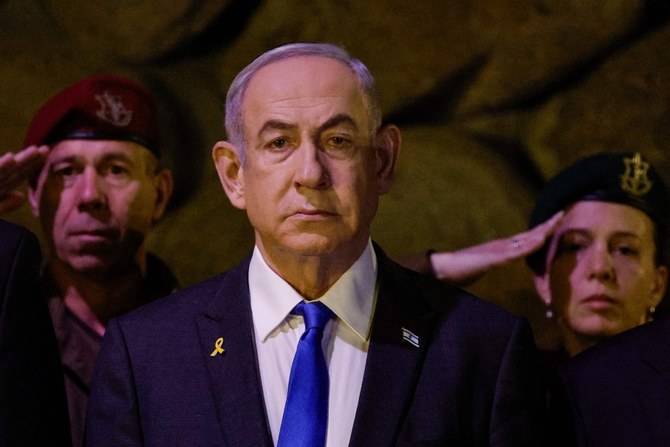
- Israel says Rafah is the last stronghold of Hamas
- Aid groups say a Rafah invasion would be catastrophic
JERUSALEM: Prime Minister Benjamin Netanyahu said Thursday that a US threat to withhold some arms would not prevent Israel from continuing its offensive in Gaza, indicating it might proceed with an invasion of the packed city of Rafah against the wishes of its closest ally.
President Joe Biden has urged Israel not to go ahead with such an operation over fears it would exacerbate the humanitarian catastrophe in the Palestinian enclave. On Wednesday, he said the United States would not provide offensive weapons for a Rafah offensive, raising pressure on Netanyahu.
But in a statement released Thursday, Netanyahu said “if we have to stand alone, we will stand alone. If we need to, we will fight with our fingernails. But we have much more than fingernails.”
Israel’s top military spokesman, Rear Adm. Daniel Hagari, also appeared to downplay the practical impact of any arms holdup. “The army has munitions for the missions it plans, and for the missions in Rafah, too — we have what we need,” he said in response to a question at a news conference.
Israel has repeatedly threatened to invade Rafah, where some 1.3 million Palestinians — over half the population — have sought refuge. The city in southern Gaza is also the main hub for humanitarian operations, which have been severely hindered by the closure of Gaza’s two main crossings this week.
Israel says Rafah is the last stronghold of Hamas and that the army must go in if it hopes to dismantle the group and return scores of hostages captured in the Oct. 7 attack that triggered the war.
In an earlier response to Biden’s decision, Israel’s far-right National Security Minister Itamar Ben-Gvir wrote a post on the platform X with a heart between the words “Hamas” and “Biden.” He and other ultra-nationalist members of Netanyahu’s coalition support a large-scale Rafah operation and have threatened to bring down his government if it doesn’t happen.
Aid groups say a Rafah invasion would be catastrophic. The UN says most of the territory’s 2.3 million Palestinians suffer from hunger and that northern Gaza is already experiencing “full-blown famine.”
Even the limited operation Israel launched earlier this week, in which a tank brigade captured the Gaza side of the Rafah border crossing with Egypt, has thrown humanitarian operations into crisis.
It also complicated what had been months of efforts by the US, Qatar and Egypt to broker a ceasefire and the release of hostages. Hamas this week said it had accepted an Egyptian-Qatari ceasefire proposal, but Israel says the plan does not meet its “core” demands. Several days of follow-up talks appeared to end inconclusively on Thursday.
Some analysts said Biden’s tough line against Israel, and the rift between the allies, threatened to weaken Israel’s negotiating position and harden Hamas’ stances. Hamas has demanded guarantees for an end to the war and a full Israeli withdrawal from Gaza as part of any deal — steps Israel has ruled out.
“It sends a discordant message at a time when Hamas is holding out on a hostage deal in the hopes that pressure will grow on Israel and it will gain a ceasefire without having to give anything in return,” said the Israel Policy Forum, a pro-Israel organization based in New York.
The war began with Hamas’ surprise attack into southern Israel, in which it killed some 1,200 people, mostly civilians, and took another 250 hostage. The militants are still holding some 100 captives and the remains of more than 30 after most of the rest were released during a ceasefire last year.
The war has killed over 34,800 Palestinians, mostly women and children, according to the Gaza Health Ministry. Israel’s offensive, waged with US-supplied munitions, has caused widespread devastation and forced some 80 percent of Gaza’s population to flee their homes.
Israel’s capture of the Rafah crossing Tuesday forced the closure of a key entry point for fuel, and it’s unclear when it will reopen. The UN agency for Palestinian refugees, known as UNRWA, said it only has enough stocks to maintain operations for a few days and has started rationing.
Israel reopened its side of the nearby Kerem Shalom crossing — Gaza’s main cargo terminal — after a rocket attack over the weekend, but UNRWA, the main provider of aid in Gaza, says aid cannot be brought in on the Palestinian side because of the security situation.
A recently reopened route in the north is still functioning, but only 60 trucks entered on Tuesday, far below the 500 that entered Gaza each day before the war.
The first aid ship bound for an American-built floating pier to be installed in Gaza departed early Thursday. But it’s unclear when that corridor will be up and running, and even then it won’t be able to handle as much aid as Gaza’s two main land crossings.
Maj. Pete Nguyen, a Pentagon spokesman, said Thursday that parts of the pier are still in the Israeli port of Ashdod awaiting more favorable seas before being moved into position off Gaza. He said the US vessel Sagamore, which left Cyprus, would transport aid to another ship, the Roy P. Benavidez, which is off the coast of Gaza.
“In the coming days, the US will commence an international community-backed effort to expand the delivery of humanitarian assistance to the people of Gaza using a floating pier,” he said.



